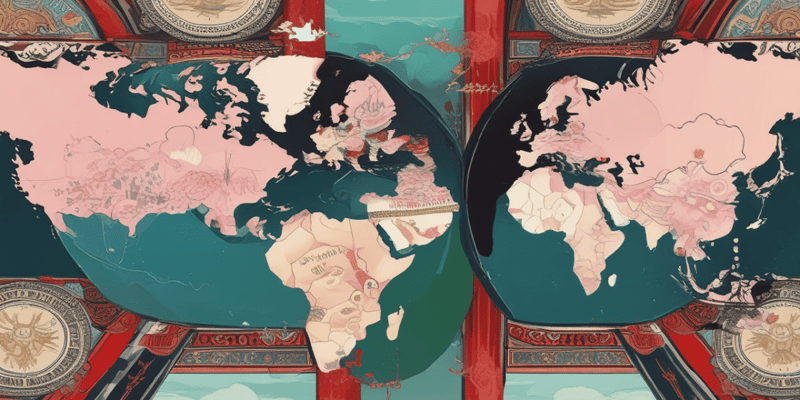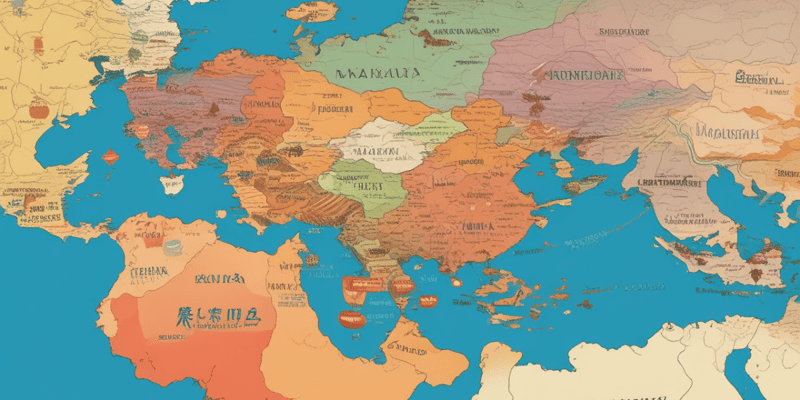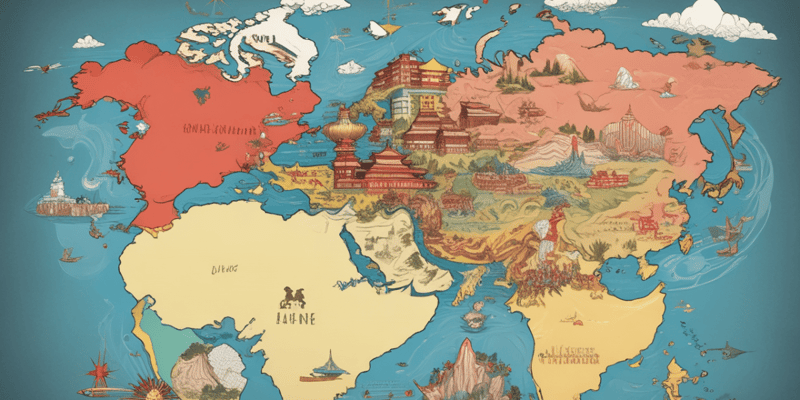Podcast Beta
Questions and Answers
What event triggered the start of World War I?
Which countries were part of the Central Powers in World War I?
Which of the following was a consequence of the Treaty of Versailles for Germany?
What did the term MAIN stand for regarding the causes of World War I?
Signup and view all the answers
What was one of the main reasons the League of Nations failed to maintain peace?
Signup and view all the answers
Which impact of World War I contributed significantly to the onset of World War II?
Signup and view all the answers
Which of the following territories did Germany lose as a result of the Treaty of Versailles?
Signup and view all the answers
During what era did the Cold War take place?
Signup and view all the answers
What is the primary purpose of sanctions imposed by one country on another?
Signup and view all the answers
Which term describes a country's ability to govern itself without outside interference?
Signup and view all the answers
What is the primary aim of diplomacy in international relations?
Signup and view all the answers
What does the term 'balance of power' refer to in international relations?
Signup and view all the answers
How many member countries are part of the United Nations?
Signup and view all the answers
What is the role of Non-Governmental Organizations (NGOs) in international relations?
Signup and view all the answers
What characteristic defines multinational corporations in the context of international relations?
Signup and view all the answers
Which of the following best describes the term 'global governance'?
Signup and view all the answers
What characterizes a totalitarian state?
Signup and view all the answers
Which event contributed to the policy of appeasement adopted by Britain and France?
Signup and view all the answers
What was a supporter’s belief regarding appeasement?
Signup and view all the answers
What was the significance of the Munich Agreement?
Signup and view all the answers
Which of the following was a direct outcome of appeasement?
Signup and view all the answers
Which action did Hitler take in 1936 that violated the Treaty of Versailles?
Signup and view all the answers
What was one of the long-term effects of the Holocaust?
Signup and view all the answers
What was one of the key events that turned the tide of World War II?
Signup and view all the answers
What action by Hitler represented a direct violation of the Treaty of Versailles in 1936?
Signup and view all the answers
Which significant event contributed to Germany's surrender in 1945?
Signup and view all the answers
What was a major consequence of the atomic bombings on Hiroshima and Nagasaki?
Signup and view all the answers
What was one of the reasons for the formation of the United Nations after World War II?
Signup and view all the answers
What action did Japan continue to take even after Germany's surrender?
Signup and view all the answers
Which of the following was a pro of dropping the atomic bombs on Japan?
Signup and view all the answers
What term describes the economic system where individuals own their properties?
Signup and view all the answers
What was a major trigger for the start of World War II in Europe?
Signup and view all the answers
What was the primary ideological difference that contributed to the Cold War?
Signup and view all the answers
Which event marked the beginning of the Space Race?
Signup and view all the answers
What was the primary consequence of the Arms Race during the Cold War?
Signup and view all the answers
Which countries were associated with communism during the Cold War?
Signup and view all the answers
What symbol is commonly associated with the Soviet Union's communist state?
Signup and view all the answers
What major geopolitical change occurred in 1949 concerning Germany?
Signup and view all the answers
What was the goal of the containment policy adopted by the United States during the Cold War?
Signup and view all the answers
What was the significance of the Berlin Wall, erected in 1961?
Signup and view all the answers
Study Notes
Sanctions
- Sanctions are restrictions or punishments imposed by one country on another to force it to change its behavior.
- Sanctions can impact a country's economy, health, and political stability.
- They can lead to reductions in Gross Domestic Product (GDP).
- Limit trade and investment.
- Restrict access to medicine, negatively impacting public health.
Key Players in International Relations
- Non-Governmental Organizations (NGOs): operate independently of governments and work on various issues, including humanitarian, environmental, and human rights.
- Sovereignty: means a country has the power to govern itself without interference from other nations.
- Balance of Power: a strategy where nations attempt to protect themselves by ensuring equal strength against rivals.
- Diplomacy: involves managing relationships between countries to protect interests and maintain peace.
- International Security: encompasses efforts by countries and organizations to ensure global safety and stability.
- Global Governance: refers to how countries and organizations collaborate to solve problems, such as climate change and security threats.
- Globalization: signifies the increasing interconnectedness and interdependence of countries through trade, technology, and culture.
- Foreign Policy: a country's plan for dealing with other nations.
- International Law: comprises rules and agreements recognized between countries.
- Multinational Corporations: companies that operate in multiple countries.
- Individuals: can influence international relations, such as activists, diplomats, or leaders.
Foundations of International Relations
- The study of international relations (IR) began in 1919, aimed at understanding and potentially resolving conflicts like war.
- The United Nations (UN) currently has 193 member countries.
Landmark IR Eras
-
World War I (1914-1918)
- Known as the "Great War."
- Began with the assassination of Archduke Franz Ferdinand of Austria-Hungary.
- Key sides:
- Allied Powers: France, Britain, Russia (later the U.S.)
- Central Powers: Germany, Austria-Hungary, Ottoman Empire.
- Characterized by trench warfare and new deadly weapons like tanks and gas.
- Ended in 1918 with Germany surrendering and the Treaty of Versailles signed in 1919.
- The Interwar Years (1919-1938)
- The Second World War (1939-1945)
- The Cold War (1947-1991)
- The New World Order (1991-2000)
- The post-9/11 era (2001-2019)
- The post-Covid-19 era (2020-?)
World War I Overview
- Millions died and countries were destroyed.
- New countries and governments were formed.
- The harsh treatment of Germany after WWI (Treaty of Versailles) contributed to the rise of tensions and ultimately, WWII.
Causes of World War I
-
MAIN: an acronym summarizing the key causes
- Militarism: belief in a strong military and aggressive use of force.
- Imperialism: extending a country's power and influence through colonization.
- Alliance System: formal agreements between nations for mutual support in case of war.
- Nationalism: intense loyalty and devotion to one's nation.
- Assassination: assassination of Archduke Franz Ferdinand (Austria-Hungary) triggered the war.
Treaty of Versailles
- Imposed harsh penalties on Germany, aiming to prevent future aggression.
- Reparations to Allied nations.
- Loss of colonies.
- Demilitarization of the Rhineland.
- Army reduced to 100,000 men.
- Limited to six battleships, banned from having submarines and aircraft.
- Lost Alsace and Lorraine to France.
- Forbidden from unifying with Austria (Anschluss).
- Lost 13% of European territory, 50% of iron reserves, and 15% of coal reserves.
- Forced to accept war guilt.
- These consequences created resentment among the German population and contributed to the rise of extremism.
Totalitarian State
- A government with absolute control over all aspects of life, including politics, the economy, and citizens' beliefs.
- Examples include North Korea and Nazi Germany.
Appeasement
- A policy adopted by Britain and France to avoid war with Nazi Germany by making concessions.
- Supporters believed this would prevent a major conflict.
- However, appeasement allowed Hitler to become more aggressive, ultimately leading to WWII.
Hitler's Actions In Europe (1936-1939)
- Germany's rearmament: Violating the Treaty of Versailles, Hitler began rebuilding the German military.
- Remilitarization of the Rhineland: In 1936, Hitler sent troops into the Rhineland, defying the Treaty of Versailles.
- Anschluss with Austria (1938): The forced unification of Austria and Germany driven by Hitler's expansionist goals.
- Munich Agreement (1938): Germany, Britain, France, and Italy agreed to hand over the Sudetenland (part of Czechoslovakia) to Germany, without Czechoslovakia's consent.
- Invasion of Czechoslovakia (1939): Hitler took over the rest of Czechoslovakia, further violating the Treaty of Versailles.
World War II
- The Holocaust: Hitler and the Nazis targeted Jews and other minorities, leading to the Holocaust, a systematic genocide that killed millions.
- Pearl Harbor (1941): Japan attacked the United States at Pearl Harbor, Hawaii, bringing the United States into the war.
- D-Day (1944): The Allied forces undertook a massive invasion of German-occupied France, marking a turning point in the war.
- Germany's Defeat (1945): The Allies defeated Germany, and Hitler committed suicide.
- Atomic Bombs: The United States dropped two atomic bombs on Japan (Hiroshima and Nagasaki), forcing Japan's surrender in 1945.
Outcome of World War II
- United Nations (UN): Following the war, the United Nations was formed, with the goal of preventing future conflicts.
- The Cold War: The end of WWII ushered in a new rivalry between the United States and the Soviet Union, known as the Cold War.
Factors Leading to Germany and Japan's Surrender
-
Germany:*
-
D-Day invasion: Allied forces successfully landed in Normandy, France, opening a new front.
-
Soviet Advance: The Soviet Union recaptured territory and pushed towards Germany.
-
Fall of Berlin: Soviet forces captured Berlin in May 1945.
-
Hitler's Suicide: Hitler died in April 1945.
-
Unconditional Surrender: Germany surrendered on May 7, 1945.
-
Japan:*
-
Continued Fighting: Japan fought on even after Germany surrendered.
-
U.S. Island Hopping: The U.S. captured key Pacific islands, gradually moving closer to Japan.
-
Atomic Bombs: The U.S. dropped atomic bombs on Hiroshima and Nagasaki.
-
High Casualties: The bombings caused widespread destruction and loss of life.
-
Japanese Surrender: Japan surrendered on August 15, 1945.
Pros and Cons of Atomic Bombs on Hiroshima and Nagasaki
-
Pros:*
-
Quick End to the War: Forced Japan's surrender, potentially saving lives.
-
Demonstration of Power: Showcased the military strength of the United States.
-
Cons:*
-
Massive Civilian Casualties: Hundreds of thousands of people died.
-
Long-term Effects: Caused enduring health problems and environmental damage.
Definitions
- Capitalism: An economic system where individuals own their property and businesses.
- Communism: A political and economic system where the state controls all aspects of society and aims to achieve equality for all citizens.
- NATO: The North Atlantic Treaty Organization, a military alliance formed to counter communist expansion during the Cold War.
- Containment: A foreign policy strategy used by the United States during the Cold War, focused on preventing the spread of communism.
The Cold War
- A conflict between the United States and the Soviet Union, fueled by ideological differences and competition for global power.
- No direct "War" occurred, but significant tensions, nuclear arms races, and proxy conflicts characterized this period.
Causes of the Cold War
- Ideological Differences: Capitalist United States versus Communist Soviet Union.
- Post-World War II Power Vacuum: The war weakened European nations, creating a vacuum for the U.S. and USSR to fill.
- Nuclear Arms Race: Both countries raced to develop more powerful nuclear weapons, increasing tensions, and creating the doctrine of MAD (Mutually Assured Destruction).
Key Cold War Events:
- **The Arms Race (1945)**: Both the US and USSR competed to develop the most powerful nuclear weapons.
- **The Space Race (1957)**: Competition between the US and USSR to achieve dominance in space exploration.
- **Germany Divided (1949)**: Germany was divided into East and West Germany, reflecting the ideological division of Europe.
- **Berlin Wall (1961)**: Constructed to separate East and West Berlin, symbolizing the division between communist and capitalist ideologies.
- **Cuban Missile Crisis (1962)**: A standoff between the US and USSR over Soviet nuclear missiles placed in Cuba, bringing the world close to nuclear war.
Studying That Suits You
Use AI to generate personalized quizzes and flashcards to suit your learning preferences.
Related Documents
Description
Explore the critical concepts of sanctions and their impact on countries in the context of international relations. This quiz covers key players, the balance of power, and the importance of diplomacy for maintaining stability. Test your knowledge about how sanctions influence economies and political dynamics globally.




